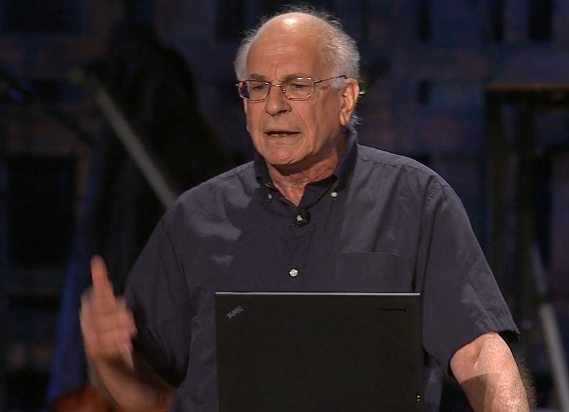This is an old study. Those are actual patients undergoing a painful procedure.
這是一個古老的研究。一些真正的病人將會接受一種痛苦的治療方法。
I won't go into detail. It's no longer painful these days,
細節(jié)不再詳述。現(xiàn)今的療法已不再如此難受,
but it was painful when this study was run in the 1990s.
但在研究進行的九十年代時,這種方法令人痛不欲生。
They were asked to report on their pain every 60 seconds.
病人每隔六十秒則必須報告他們的痛苦指數(shù)。
Here are two patients, those are their recordings.
這邊有兩位病患,這是他們的記錄。
And you are asked, "Who of them suffered more?" And it's a very easy question.
我問你:“在他們之中誰最痛苦?”這個問題很簡單。
Clearly, Patient B suffered more -- his colonoscopy was longer,
顯然,是病人B。他的結腸鏡檢查時間較長,
and every minute of pain that Patient A had, Patient B had, and more.
病人A每分鐘感覺的痛疼,病人B也感覺到了,而且持續(xù)更久。
But now there is another question: "How much did these patients think they suffered?"
但現(xiàn)在還有另一個問題:這些患者認為他們受罪了嗎?

And here is a surprise.
這里有個小意外:
The surprise is that Patient A had a much worse memory of the colonoscopy than Patient B.
令人驚訝的是病人A對結腸鏡檢查的記憶比病人B還糟糕。
The stories of the colonoscopies were different,
兩段結腸鏡檢查的故事不同,
and because a very critical part of the story is how it ends.
這關鍵在于故事的結尾--
And neither of these stories is very inspiring or great -- but one of them is this distinct
兩個故事都不怎么啟迪智慧--但兩者顯然是不同的...
but one of them is distinctly worse than the other.
顯然其中之一的感受比另一個還差。
And the one that is worse is the one where pain was at its peak at the very end; it's a bad story.
感覺較糟的這一個是在最后的時期里知曉什么是痛絕人寰。這不是個好故事。
How do we know that?
我們是怎么知道的?
Because we asked these people after their colonoscopy, and much later, too,
因為我們在檢查結束后問他們,以及在很久之后再問一次他們,
"How bad was the whole thing, in total?"
“你們對結腸鏡檢查的整體印象如何?”
And it was much worse for A than for B, in memory.
結果是A的記憶感覺明顯要比B更糟糕。
Now this is a direct conflict between the experiencing self and the remembering self.
現(xiàn)在這是經(jīng)驗自我和記憶自我之間的直接沖突。











